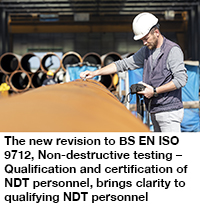International standard on certifying NDT personnel has been revised
03/05/2022
The British Standards Institute (BSI) has recently published a revised version of BS EN ISO 9712, the international standard on the qualification and certification of non-destructive testing (NDT) personnel.
NDT standards are needed to ensure quality control and health and safety across the industry. Everyone who conducts NDT work should be certificated and employers have a responsibility to ensure that their NDT personnel are correctly qualified to competently carry out this vital work.
BS EN ISO 9712 provides global best practice requirements for the qualification and certification of people who perform industrial NDT in the following methods: acoustic emission testing, eddy current testing, thermographic testing, leak testing (hydraulic pressure tests excluded), magnetic testing, penetrant testing, radiographic testing, strain gauge testing, ultrasonic testing and visual testing (direct unaided visual tests and visual tests carried out during the application of another NDT method are excluded).
The specifications described in BS EN ISO 9712 can also apply to other NDT methods and to new techniques within an established NDT method, provided a comprehensive scheme of certification exists and the method or technique is covered by international, regional or national standards.
The purpose of this international standard is to ensure the competence of people performing NDT, that organisations who certificate NDT personnel conduct their certification credibly and to develop the expertise of users in NDT certification.
BS EN ISO 9712 underwent its latest systematic review by a committee of industry experts, which revealed there was room for improvement with regards to its ease of use by adopters in the industry.
The recently published revision includes clarifications throughout to ensure the wording in the standard is relevant, up-to-date and unambiguous. In addition, other changes include:
- Conflicts between BS EN ISO/IEC 17024 on requirements for bodies operating certification of persons and this standard have been resolved
- Reference to BS EN ISO 18490, Non-destructive testing – Evaluation of vision acuity of NDT personnel, has been added.
While certification to BS EN ISO 9712 provides a way of demonstrating the general competence of NDT personnel, it does not represent an authorisation to operate, since this remains the responsibility of the employer. In order to carry out NDT work, certificated employees may require additional specialised knowledge of parameters such as equipment, NDT procedures, materials and products specific to their employer.
Jennifer Cook, Certification Manager at the British Institute of Non-Destructive Testing (BINDT), commented: “With the need to ensure a safe and environmentally friendly world, there is a requirement for the certification of personnel involved in NDT to be suitably trained and assessed to ensure that they are competent to test both newly manufactured items that are using modern material manufacturing processes and to be able to test older items for in-service degradation. The tester’s toolbox is constantly evolving with advances in technology, allowing more data processing and better image capture while still having a need to be competent to use more historical methods. The certification processes need to accommodate these varied requirements and the revision of BS EN ISO 9712 has strived to do this.”
BSI shares knowledge, fosters innovation and instils best practice as the UK’s national standards body. It helps to improve the quality and safety of products, services and systems by enabling the creation of standards and encouraging their use.
More details on the latest revision of BS EN ISO 9712 can be found at: https://pages.bsigroup.com/ISO9712
www.bsigroup.com